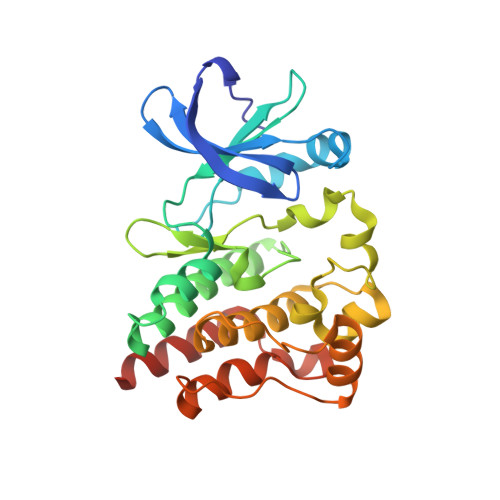Battling Btk Mutants With Noncovalent Inhibitors That Overcome Cys481 and Thr474 Mutations.
Johnson, A.R., Kohli, P.B., Katewa, A., Gogol, E., Belmont, L.D., Choy, R., Penuel, E., Burton, L., Eigenbrot, C., Yu, C., Ortwine, D.F., Bowman, K., Franke, Y., Tam, C., Estevez, A., Mortara, K., Wu, J., Li, H., Lin, M., Bergeron, P., Crawford, J.J., Young, W.B.(2016) ACS Chem Biol 11: 2897-2907
- PubMed: 27571029
- DOI: https://doi.org/10.1021/acschembio.6b00480
- Primary Citation of Related Structures:
5KUP - PubMed Abstract:
The Bruton's tyrosine kinase (Btk) inhibitor ibrutinib has shown impressive clinical efficacy in a range of B-cell malignancies. However, acquired resistance has emerged, and second generation therapies are now being sought. Ibrutinib is a covalent, irreversible inhibitor that modifies Cys481 in the ATP binding site of Btk and renders the enzyme inactive, thereby blocking B-cell receptor signal transduction. Not surprisingly, Cys481 is the most commonly mutated Btk residue in cases of acquired resistance to ibrutinib. Mutations at other sites, including Thr474, a gatekeeper residue, have also been detected. Herein, we describe noncovalent Btk inhibitors that differ from covalent inhibitors like ibrutinib in that they do not interact with Cys481, they potently inhibit the ibrutinib-resistant Btk C481S mutant in vitro and in cells, and they are exquisitely selective for Btk. Noncovalent inhibitors such as GNE-431 also show excellent potency against the C481R, T474I, and T474M mutants. X-ray crystallographic analysis of Btk provides insight into the unique mode of binding of these inhibitors that explains their high selectivity for Btk and their retained activity against mutant forms of Btk. This class of noncovalent Btk inhibitors may provide a treatment option to patients, especially those who have acquired resistance to ibrutinib by mutation of Cys481 or Thr474.
Organizational Affiliation:
Biochemical and Cellular Pharmacology, Genentech , 1 DNA Way, South San Francisco, California 94080, United States.


















